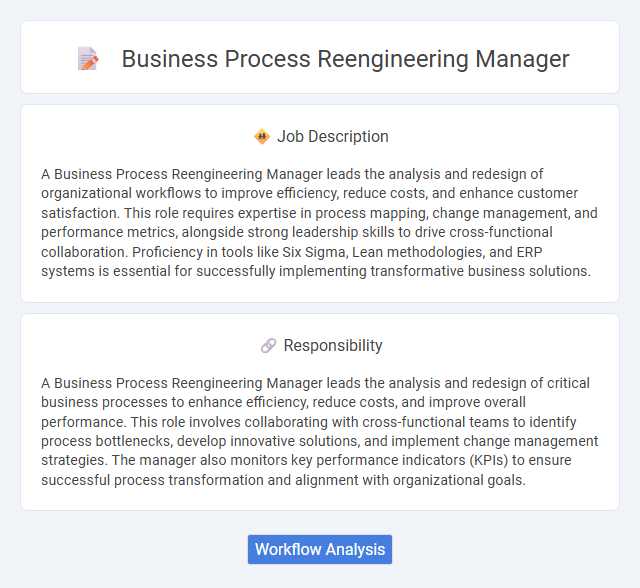
A Business Process Reengineering Manager leads the analysis and redesign of organizational workflows to improve efficiency, reduce costs, and enhance customer satisfaction. This role requires expertise in process mapping, change management, and performance metrics, alongside strong leadership skills to drive cross-functional collaboration. Proficiency in tools like Six Sigma, Lean methodologies, and ERP systems is essential for successfully implementing transformative business solutions.
Individuals with strong analytical skills, adaptability, and a willingness to embrace change are likely to thrive as Business Process Reengineering Managers. Those who are comfortable with leading cross-functional teams and managing complex projects may find this role particularly fitting. People resistant to change or lacking problem-solving abilities might struggle to meet the demands of this position.
Qualification
A Business Process Reengineering Manager typically requires a bachelor's degree in business administration, management, or a related field, with many employers preferring an MBA or advanced certification such as Six Sigma or Lean Management. Proven experience in process analysis, project management, and strategic planning is essential, alongside strong skills in data analytics, change management, and stakeholder communication. Proficiency in business process modeling tools and methodologies, combined with leadership capabilities, drives successful reengineering initiatives and operational improvements.
Responsibility
A Business Process Reengineering Manager leads the analysis and redesign of critical business processes to enhance efficiency, reduce costs, and improve overall performance. This role involves collaborating with cross-functional teams to identify process bottlenecks, develop innovative solutions, and implement change management strategies. The manager also monitors key performance indicators (KPIs) to ensure successful process transformation and alignment with organizational goals.
Benefit
A Business Process Reengineering Manager likely enhances organizational efficiency by identifying and redesigning core workflows, which can lead to significant cost savings and improved productivity. They probably facilitate better alignment between business processes and strategic goals, increasing the company's adaptability in dynamic markets. The role may also foster innovation by encouraging cross-functional collaboration and integrating new technologies.
Challenge
The role of a Business Process Reengineering Manager likely involves navigating complex organizational challenges to identify inefficiencies and redesign workflows. Probability indicates frequent encounters with resistance to change from stakeholders as reengineering efforts disrupt established routines. Success may depend on balancing innovative strategies with practical implementation to achieve measurable improvements in operational performance.
Career Advancement
Business Process Reengineering Managers drive strategic transformation initiatives that streamline operations and boost organizational efficiency, positioning themselves as key leaders in change management and operational excellence. Expertise in analyzing complex workflows and implementing innovative process redesigns enables significant cost reductions and improved performance, enhancing opportunities for leadership roles such as Director of Operations or Chief Transformation Officer. Mastery of process optimization tools and data-driven decision-making is essential for career advancement and gaining influence in executive decision-making teams.
Key Terms
Workflow Analysis
A Business Process Reengineering Manager specializing in workflow analysis identifies inefficiencies and redesigns processes to improve operational performance and reduce costs. They leverage data-driven techniques and process mapping tools to diagnose bottlenecks, streamline activities, and enhance cross-functional collaboration. This role requires expertise in process optimization, project management, and change management to drive sustainable business transformation.
 kuljobs.com
kuljobs.com